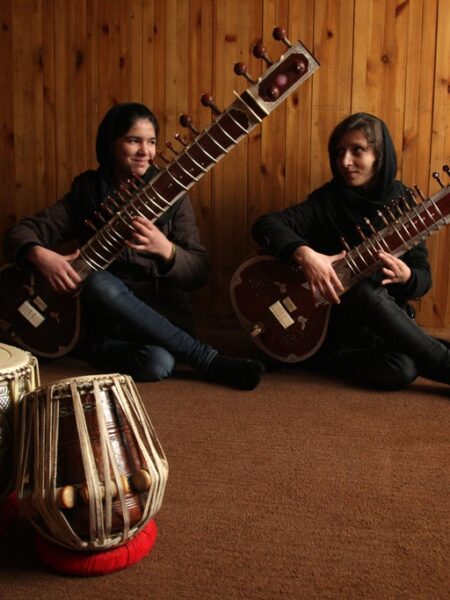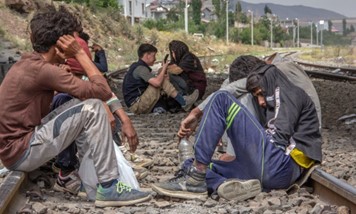Introduction
The Taliban is a military organization founded in the early 1990s and ruled over most of Afghanistan until October 2001. Afghan girls were prohibited from attending school, pursuing higher education, or working during their regime.
During that time, women were required to wear veils and were not allowed to travel alone but were required to be accompanied by a male companion, like their husband, father, or brother.
In certain parts of the country, covert home schools offered primary education. These schools mainly emphasized the study of the Quran and basic school subjects. Home vocational training programs also focused on enhancing practical abilities like handicrafts, tailoring, dress design, sewing, and stitching.
In December 2001, the Taliban government was toppled, and a new government was formed through the 2002 Grand Assembly. To lead the Afghan Transitional Administration, the government appointed an Interim President. Following the 2004 Afghan presidential election, the newly implemented constitution was crucial in restoring and defending women’s rights.
In the past two decades, significant progress has been made in improving women’s access to education, work, and healthcare, particularly for those in or near urban areas.
In 2021, the Taliban regained control of Afghanistan after a twenty-year insurgency. During their second rule, the Taliban imposed strict limitations on Afghan women, prohibiting school attendance for girls in grades six through twelve. In just eight months of being in power, the Taliban also banned universities for girls in Afghanistan.
Recognizing the vital role of women in our society and ensuring they are granted the same rights as men is of utmost importance. Unfortunately, the Taliban has consistently prevented women from participating in social, economic, and political aspects of life. Nonetheless, it is essential to note that every girl in Afghanistan has the fundamental right to receive an education and attend school or university. This research delves into the violation of women’s rights during two Taliban regimes, specifically the ban on education and engagement in public activities. The study examines the similarities and differences between two groups of women from different generations impacted by this decree.
Literature review:
During the Taliban’s rule over Afghanistan from 1996 to 2001, Afghan society underwent significant changes and tragedies. One of the most significant tragedies was the violation of women’s rights and their freedom. Women were stripped of their fundamental rights during this period, including the right to leave their homes, receive an education, teach, work, own businesses, and participate in social and political activities. These rights were no longer available to women. (Mousavi 2022)
In 2021, the Taliban regained control of Afghanistan, two decades after being removed by American forces. Their severe governance has resulted in the suppression of women’s rights and disregard for essential services. (Council on Foreign Relations, 2023 )
The Taliban closed girls’ schools when they overtook Afghanistan but promised to respect girls’ education rights. But on the school’s first day on March 23, 2022, the Taliban shamefully broke their promise and sent teenage girls home. (Human Rights Watch, 2023)
It is essential to acknowledge the unjust removal of women from their roles as deputy and director and the forced absence of women from government and non-government institutions, including the judicial system. Furthermore, it should be noted that young girls beyond sixth grade were prohibited from attending school, and women and girls were unfairly denied educational opportunities in schools, universities, and training facilities. (Afghanistan International, 2023)
It is now required for female presenters to wear a black hijab. Failure to comply will result in punishment for the male members of their family. Furthermore, all productions and shows starring female actresses have been banned. Bathhouses and sports clubs designated for women have also been shut down, and limitations have been enforced on women’s access to leisure facilities. Women are not allowed to drive, and no woman has the right to travel by herself without a male companion. Women’s protests were systematically suppressed by arresting, torturing, and even killing protesting women. The Taliban administration has officially announced a series of restrictions, including removing images of women from advertisements and banning music and singing for everyone, particularly women and girls. (Afghanistan International, 2023)
According to some female students, the closure of girls’ schools beyond sixth grade has had a detrimental impact on their mental state. They eagerly await news of the reopening of girls’ schools in the country, despite over a year having passed since the closure of schools for female students above sixth grade. (TOLO NEWS, 2022)
In Afghanistan, girls and women have been denied their right to education. They are prohibited from attending secondary school and higher education, a fundamental right for everyone. (TOLO NEWS, 2022)
Despite the significant challenges, the decision is devastating and threatens the vast progress made in education over the past two decades. Additionally, it makes Afghanistan the only country in the world to suspend girls’ and women’s access to education. (UNESCO, 2023)
Research Question, Methodology:
- What are the similarities and differences in women’s experiences facing educational restrictions imposed by the Taliban in 1996 and 2021?
- Can technological advancements like the Internet, media, and smartphones aid the younger generation of women prohibited from receiving education and participating in public life since 2021?
The basis of my methodology originates from my research on oral history. I interviewed five women under the Taliban regime in 1996 and five girls who faced similar restrictions in 2023. Throughout the process, I gathered primary data. The duration of each interview was around three hours. Before conducting the interview, the participants were informed that they would be asked questions for a research project related to the Global History Dialogue course. Each interviewee was provided with a consent form obtained before proceeding with the interview. I have asked individuals about their overall perspectives on girls’ education in Afghanistan during the first and second rules of the Taliban.
Additionally, I have requested that they share their emotions and thoughts on the matter. I utilized interview transcripts and took notes to understand the data for my project better. I identified critical ideas and themes to highlight the most intriguing information. During the interviews, I recorded them on my phone and took notes simultaneously. Ultimately, I created a short documentary as the final product.
Generations of women faced identical limitations:
My research focuses on two generations of women impacted by the Taliban’s ban on education. My mother and I experienced the same limitations on our social and political lives during the Taliban regime. My research aims to identify the similarities and differences between these two periods for Afghan women.
In 1996, the Taliban took over Afghanistan and banned women’s education, forcing them to stay home. Girls aged eight and above were prohibited from receiving an education or leaving their homes without a male companion and were required to cover themselves completely. Similarly, in 2021, when the Taliban regained power, these restrictions were reinstated.
Following the US invasion in 2001, the Taliban lost their grip on power, and a new constitution was implemented to restore and uphold women’s rights.
In the past two decades, women have seen significant advancements in their ability to access education, employment, and healthcare, particularly in urban and suburban areas. However, women living in remote villages still face challenges when accessing education.
History has repeated as the Taliban regained power in Afghanistan in 2021.
Women in Afghanistan have once again been forced to leave their schools and universities, leaving them without hope. While every Afghan woman and girl has their perspective on what’s happening, I’ve interviewed a group of women representing both the 1990s and 2021 generations.
I found that both generations were compelled to stay home and prohibited from pursuing education and work.
The Taliban has imposed strict rules on Afghan women, with the Ministry of Vice and Virtue leading the charge. Interestingly, this ministry has replaced the Ministry of Women’s Affairs. These rules prohibit women from attending schools and universities, traveling without a male companion, and working for governmental and non-governmental organizations.
In Afghanistan, women are not allowed to work outside their homes, which deprives them of economic autonomy.
Since the Taliban took over, approximately 2.5 million girls and young women have been denied access to formal education.
During my interviews with women from different generations, they shared their experiences of facing similar strict rules and regulations. These women expressed feelings of hopelessness and frustration due to their restricted lives. Both groups of women and girls I spoke with miss the company of their co-workers, friends, and classmates, and both generations feel confined to their homes.
Farhat, a 17-year-old student in 11th grade, has been unable to attend school since the Taliban took control in 2021. She expressed her disappointment, stating that she feels like she is missing out on something essential and has lost her motivation. Her ultimate dream was to become a successful businesswoman, but her current priority is to have the opportunity to attend school again. She believes that education is necessary to achieve anything.
Marzeya, a 41-year-old mother of five children and three girls, has been a teacher for 18 years in one of the governmental schools in Kabul, Afghanistan.
Marzeya vividly remembers when the Taliban took over Afghanistan in 1996. At the time, she was the same age as her eldest daughter and felt sad and helpless. She lost her self-confidence and became ill thinking about her future. Despite losing contact with her teachers and classmates, Marzeya never gave up and continued learning from home to home.
Marzeya recalled her high school days in 1995 and the similar situation her three daughters are now facing. She remembers feeling hopeless and missing her classmates but had no means to reach out to them since there were no telephones at that time. Losing her hopes and dreams was a challenging experience that she didn’t want her daughters to go through.
I have spoken with women from both generations who have shared that the economy experienced a crisis during both Taliban regimes. Unfortunately, this led to poverty, resulting in Afghan families agreeing to child marriages.
During the reign of the Taliban, Afghan women lost their jobs and were relegated to being full-time homemakers. Unmarried women, including university students, had nothing to do but worry about their future.
During my interviews, I discovered noticeable differences due to advancements in technology and media. Afghan women in 1996 shared that they were cut off from the world outside of their homes, but girls in Kabul and other major cities now have access to smartphones, which enable them to stay connected with loved ones through the internet. Additionally, some girls can attend online classes, which helps them continue their education to a certain extent.
Parwen, a 40-year-old mother, has six children, three girls prohibited from attending school since the Taliban took over in 2021.
Parwen thinks that the 1990s and the present day are the same. She believes that both generations have lost their dreams. “The only obvious difference I see is that my daughters call their classmates; they have the internet to read something, while for me, it is like a home prison,” Parwen said.
Rana is an 18-year-old student in her final year of high school at a government school in Kabul, Afghanistan. She expressed her disappointment when the Taliban arrived. Her younger sister attends school and helps her with homework after school. It saddens her that she cannot attend school like her sister. When attempting to study, she encounters various issues and queries that only her teacher can assist her with.
Consequently, she chose to pursue her studies online. Furthermore, family perspectives varied. Families support their daughters’ education and encourage them to strive for success. However, during the initial phase of the Taliban, parents needed to prioritize their daughters’ schooling.
Throughout their regimes, the Taliban severely restricted Afghan women’s rights, limiting their freedoms and opportunities. This has been an ongoing issue for women in both generations.
Documentary:
Conclusion:
In both periods of Taliban rule, education was forbidden, and female employees were dismissed from all governmental and non-governmental institutions, thus being forced to stay home. This fundamental similarity is evident.
Due to restrictions on park visits, many families have adopted similar daily routines. Unfortunately, some families have been forced to sell their daughters or children due to their poor economic situation. School closures have resulted in an increase in underage and forced marriages. As a result, many girls have lost their confidence and are now dependent on their families, leading to a stagnant social situation.
The first and second periods of the Taliban regime share similarities. Still, the second period stands out due to the presence of technology and the Internet, allowing them to connect with people globally. Nowadays, some girls study through online platforms. Conversely, during the first period, television was banned, and access to media was restricted, leading to limited exposure to world news for the people.
Bibliography
Afghanistan International . Afghanistan International. March 2, 2023.
Council on Foreign Relations. The Taliban in Afghanistan. January 19, 2023 . https://www.cfr.org/backgrounder/taliban-afghanistan#:~:text=The%20Taliban%20returned%20to%20power,their%20ouster%20by%20U.S.%20troops.
Human Rights Watch. One Year On, the Taliban Still Attacking Girls’ Right to Education. March 24, 2023. https://www.hrw.org/news/2023/03/24/one-year-taliban-still-attacking-girls-right-education#:~:text=The%20Taliban’s%20misogynistic%20regime%20has,respect%20girls’%20right%20to%20education.
NEWS, TOLO. TOLO NEWS. 2022. https://tolonews.com/fa/afghanistan-177853.
Seyyed Mohammad Mousavi, a master’s student in the field of international relations. Examining the Taliban’s attitude towards women. December 1, 2022. https://www.etilaatroz.com/161709/%D8%A8%D8%B1%D8%B1%D8%B3%DB%8C-%D8%B1%D9%88%DB%8C%DA%A9%D8%B1%D8%AF-%D8%B7%D8%A7%D9%84%D8%A8%D8%A7%D9%86-%D9%86%D8%B3%D8%A8%D8%AA-%D8%A8%D9%87-%D8%B2%D9%86%D8%A7%D9%86/.
TOLO News. The negative effects of closing Schools on the psyche of female. Kabul: TOLO News, 2022.
UNESCO. UNESCO. April 20, 2023. https://www.unesco.org/en/articles/let-girls-and-women-afghanistan-learn.













thank you so much dear Frishta, your information in case of Afghan woman’s situation during Taliban government was wonderful and clear.
Best regards.
good luck!
Thank you so much, Ms. Farishta Jan, for your impressive work. Despite being only a second-year bachelor’s degree student, your capacity for conducting such insightful research is remarkable. We undoubtedly need more voices and analyses from Afghanistan to lay a foundation for informed policymaking, especially in the current context. Your continued research efforts are essential. I am also conducting research focused on Afghanistan, particularly on Afghan women, and came across your article via Google. It would be wonderful to explore potential collaboration in this area. For further information about me and my work, please feel free to search my name on social media, where my contact details are also available. I look forward to the possibility of working together.
Jandad Jahani
Former Lecturer of Paktia University
Thank you so much for your information about girls and women education situation in Afghanistan
Best regards
Wish you luck